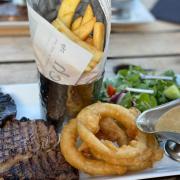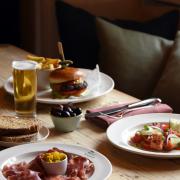And the winner of the Cheese Lovers' Trophy sponsored by Cotswold Life is....
'Isis', produced by the Oxford Cheese Company
Made from pasteurised cow's milk and traditional rennet, Oxford Isis is a pale soft cheese encased in a slightly darker yellow rind. The rind is sprayed with mead wine and ripened with Oxfordshire honey which allows the fresh cheese inside to mature into a creamy consistency. This understandably results in a highly distinctive smell and taste, which really wowed the judges!
The Oxford Cheese Company has been making Isis since 2003 after a desire to compete with the abundance of French cheeses on the market, including Epoisses, Soumaintrain and Affidelice. After being sampled by local restaurants and the students of Oxford University, demand soared and it can now be found in some of the country's top eateries as well as a host of first-class British Airways and Virgin flights. Incidentally the name was inspired by the locals' nickname for the River Thames as it flows through the city.
The judges were also very impressed with the numerous other cheeses put forward in this category and highly commended Quickes Goat Cheddar, Yarg and Wild Yarg Cornish Cheeses, Jonathan Crump's Single Gloucester PDO, the Traditional Cheese Dairy Company's Lord of the Hundreds, Traditional Creamy Lancashire by Dew-Lay Products Ltd, Adelstrop by Daylesford Creamery, Lincolnshire Poacher, Neustift Seville, Hafod from Holden Farm Dairy, Pant-ys-gawn Farm with Ash by Abergavenny Fine Foods and Snodsbury by Anstey's of Worcester.
For further information including a full list of all the awards winners please visit www.thecheeseweb.com
Caption:
Publisher of Cotswold Life Wendy Carter with Sophia Pouget de St Victor and Robert Pouget de St Victor.
Listening to Harley Pouget talk about his cheese is like listening to a proud parent: a parent whose offspring has just come top of the form. Oxford Isis, the cheese he dreamed up with his father, Robert, in 2003 has won this year's Cheese Lovers' Trophy. And it's a reward that's long overdue, for strangely (and unjustly) this superb cheese has all-too-often been overlooked in the past.
"It was my birthday weekend, and I was in bed about 9.30pm, reading - absolutely exhausted - and my father phoned me and said 'We've won an award!'" Harley says. "As far as I'm concerned, that was the icing on the cake. To some people, a trophy is a funny sort of reward; but for me, cheese-making is real creativity. Any money is just a by-product."
Indeed, Harley eschewed city life 20 years ago in favour of a spot of culture. That's milk-based culture, of course. Since then, he's worked alongside his father, Baron Robert Pouget, at the Oxford Cheese Company: "I do a lot of the duck's feet bit - the frantic paddling under the surface," he says.
Oxford Isis was his concept. So how do you go about 'inventing' a new cheese? "It's a lot of tinkering and experimentation. And a lot of problem-solving, too: maturing temperatures; ripening processes, coliforms..." Pretty technical stuff.
But for the layperson - in other words, those of us who just enjoy eating it - all you need to know is that there are secrets in the making. Some Harley will give away (that it's washed with five-year-old full-flavoured local mead that continues to mature in the bottle); and some that he keeps close to his chest (the exact process by which the cheese is lightly washed).
The closest you'll get to it is Stinking Bishop, but that's made in a very English sort of way, whereas Harley uses a French method. As a result, Oxford Isis is easy to handle and has admirably filled a gap in the market. The Pougets did the same thing some 15 or more years ago when they spotted an opening for a soft English blue cheese after the demise of Limeswold. The highly successful Oxford Blue was born as a result.
Its younger brother, Oxford Isis, can now be doted on with equal pride.


























